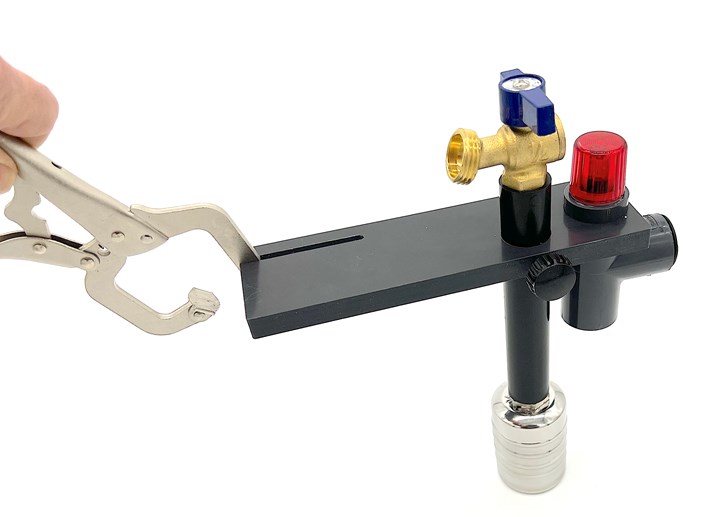Auto Hose Filler Stops Process Tank Spills
The Auto Filler allows process tanks to be filled by hose and automatically shuts off water at the correct level.

Filling process tanks with hoses presents the risk of overflowed tanks. The Hose Filla prevents overfilling by shutting off the water flow from any hose automatically. When the tank liquid level reaches the auto shutoff valve, the float switch shuts down the flow using the same principle as a gas nozzle. The device clamps to a tank lip quickly and securely with locking pliers so water can’t go anywhere but in the tank. There is even an emergency overfill alarm in case something goes wrong.
Simply clamp the auto hose filler plate to a tank lip. It accommodates tank lip widths up to 4” and thicknesses up to 2” easily with locking pliers. Then adjust the depth of the float valve using the thumbscrew knob. Finally, just open the manual valve (the blue handle) to start water flow from the hose. When the liquid level reaches the float valve, the flow stops automatically.
Hose Filla clamps to a very wide range of tank lip sizes. The overfill alarm built-in has a 10 year life. Adjustable fill depth from 1-7 inches is easily adjustable with a thumbscrew. Locking pliers fold up compactly.
Gizmo Engineering | 585-301-0970 | gizmo-engineering.com
Related Content
-
Finisher’s ‘Top Shop’ Status Attracts Business
This competitive California finisher made it a goal to become a PF Top Shop. After earning the recognition, the company experienced an immediate increase in business and a challenge to obtain certifications.
-
Selecting high-capacity anodizing tanks
Process tanks are the foundation of finishing. Asa Halliday of Tri-Mer Corp. discusses considerations to keep in mind when selecting anodizing tanks.
-
Plasma Electrolytic Oxidation (PEO): A High-Performance Coating for Light Metal Alloys
Plasma Electrolytic Oxidation (PEO) offers an innovative approach to high-performance coatings for light metal alloys, providing superior alternatives to traditional hard anodizing. The process transforms the surface of metals like Al, Mg and Ti into a robust oxide layer with customizable properties, tailored for demanding applications in aerospace, semiconductor, and industrial manufacturing.













